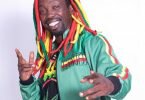Whoever said that an artiste never dies was right. Fourteen years after Ochieng’ Kabaselleh died, “Mathews Anyumba Juma”, a new track he composed and only partially recorded has been released.
By the time he died in 1998, Kabaselleh had only recorded the vocals and rhythm guitar.
Ochieng’ Kabaselleh was a great composer, a superb vocalist, an excellent guitarist and a captivating stage performer
Singing in Lingala and Dholuo, Kabaselleh criticises many Kenyan musicians for being cheap, saying that some go as far as composing praise songs for those who buy them beer or give them a few Kenyan Shillings. Some he says, compose songs for those who give them lift, or offer them accommodation in Nairobi.
Kabaselleh further criticises Kenyan musicians who keep on going to witch doctors in order to become famous.
He challenges them to sing about significant events and societal heroes.
Recording of the song “Mathews Anyumba Juma” was completed by Kabaselleh’s son Babu Kabaselleh and Madaraka Uledi.
Aware that Kabaselleh was a perfectionist, it wasn’t easy for Babu and Madaraka to complete the project.
Ochieng’ Kabaselleh alias Kallé, Mbuta Kidi, Obwogo Kwach wuod Ogolla, Mbuta Masanga
Babu added that they worked on the song a number of times in various studios just to get it right at least to the level that Kabaselleh would have wanted it to be. “It took us more than three years to get the song to an acceptable level, so that shows you the amount of commitment we placed on it,” Babu said.
After being introduced to the music world by Fadhili Williams (the composer of the famous “Malaika” hit) and Daudi Kabaka, Kabaselleh honed his music skills in the company of Nairobi based Congolese musicians, helping to carry instruments in exchange for guitar playing lessons.
Born Hajullas Nyapanji, the young musician chose artistic name Ochieng’ Kabaselleh partly to hide his music activities from his mother, partly because of great admiration he had for the great Congolese musician Joseph Athanase Tchamala Kabaselleh, popularly known as Le Grand Kallé.
He joined the music scene in the late 60s, at a time when many Kenyan musicians were playing Benga music. Kabaselleh, however, wanted to play something different, complicated, modern but with a traditional touch.
As he became one of the most versatile musicians in Kenya in the early 70s, Kabaselleh and his Lunna Kidi Band developed a unique blend of Kenyan and Congolese rumba, which he baptised “Mbuta Dance”.
Babu Kabaselleh, leader of Lunna Kidi Band said it took them “more than three years to get the song to an acceptable level”
Kabaselleh was a great composer, a superb vocalist, an excellent guitarist and a captivating stage performer. He was an entertainer and social commentator who used his music to educate and inspire the society.
Most of his songs released in the early 80s and 90s such as “Achi-Maria”, “Wuora Ogolla Adoyo”, “Zainabu”, “Nyager”, “Millicento”, and “Mbuta Mombasa” still get a lot of airplay on Kenya’s radio stations. They are also continuously played by live bands throughout the country.
Apart from being my favourite musician, Kabaselleh was a very dear friend who taught me so much.
Rest in Peace Ochieng’ Kabaselleh alias Kallé, Mbuta Kidi, Obwogo Kwach wuod Ogolla, Mbuta Masanga.
“Mathews Anyumba Juma” has been released by Equator Heritage Sounds and can be downloaded from www.cdbaby.com/cd/hnochiengkabaselleh.
By Stephen Ogongo Ongong’a






